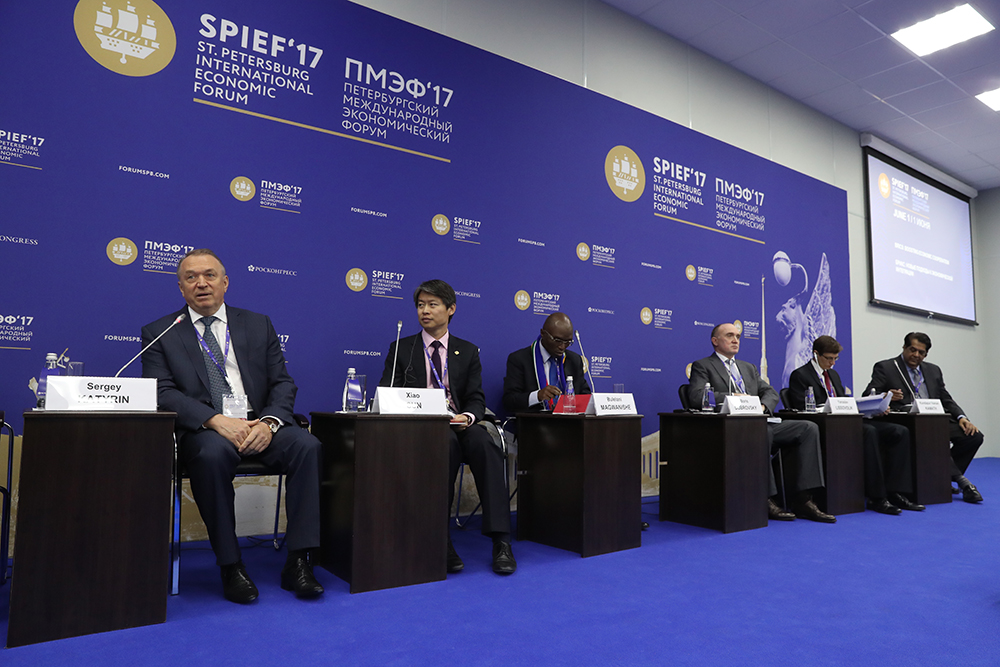
BRICS: Boosting economic cooperation
The panel session ‘BRICS: Boosting economic cooperation’ opened with an address from President of the Chamber of Commerce and Industry of the Russian Federation Sergey Katyrin. He noted that 40% of the world’s population lives in BRICS countries. “That’s 22% of the entire planet’s gross product. There is enormous potential, so business communities have a huge desire to expand economic cooperation. We see opportunities that have not been fully implemented by our countries”, Katyrin said.
The BRICS New Development Bank (NDB) President Kundapur Vaman Kamath concurred with this view. He said that the activities of BRICS nations account for more than two-thirds of economic growth around the world. “We can cooperate more than we are now and grow much faster”, Kamath said. He believes that a consensus needs to be reached among BRICS nations to use local currencies. “Investments in local currencies can help develop markets”, he said. He stressed that the use of local currencies would be incentivized and that an agreement could be reached on this in the next year or two. The speaker also spoke about the projects financed by the New Development Bank. In its first year of operation, the bank approved loans totalling USD 1.5 billion.
Deputy Minister of Trade and Industry of South Africa Bulelani Magwanishe said that BRICS creates opportunities not only for China or Brazil, but for Africa as well. “Regional industrialization and localization are all very important areas for the people of Africa. In South Africa, a BRICS regional branch has been established, which aims to cooperate and identify difficulties that complicate our work. [...] We have identified a number of problems that are hampering economic growth. The objective of the BRICS Council in South Africa is to identify projects that could be implemented in the field of insurance, agriculture, infrastructure, and construction”, Magwanishe concluded.
Chief Economist and Member of the Management Board of the Eurasian Development Bank (EDB) Yaroslav Lissovolik believes that BRICS countries face foreign economic as well as internal economic challenges. In particular, he noted the high level of inequality in the distribution of incomes among the population. Inequality is also found in the distribution of income among the regions. Lissovolik said these challenges must be addressed through developing infrastructure and human capital. The work of institutions and development banks can help with this, he concluded.
Chair of the International Chamber of Commerce World Chambers Federation Peter Mihok said he is confident that BRICS has emboldened the work of the public chambers of all member countries. “Key members of the chambers of commerce – small and medium business – are an important part of the supply chain”, he stressed.
For his part, Deputy Director General of the Cooperation Department at the China Council for the Promotion of International Trade Sun Xiao informed the session participants about what would be taking place at the BRICS Business Forum in China. He said the forum would address four main themes: trade and investment in the context of globalization, communication between BRICS member nations, financial cooperation and development, and the “blue economy”.
Chelyabinsk Region Governor Boris Dubrovsky spoke about interaction at the regional level. He noted that the Chelyabinsk Region is vying for the right to host the SCO and BRICS summits in 2020. The governor said the region’s main partner is China. “Our trade turnover over the past year exceeded one-third of a billion dollars. We have set the goal of tripling this volume in the coming years. We have chosen a strategy of building relations and our priorities are: agriculture, transport and logistics, the manufacturing industry, and food supply”, Dubrovsky said.
Russian Railways First Vice President Alexander Misharin spoke about the company’s plans for the future. “Russia and China are implementing a joint project to develop high-speed traffic, which has not only turned into the implementation of the concept of the Silk Road idea, but also into a project called Eurasia that involves the connection of the largest high-speed systems in Europe and Asia. Over this time, China has created its own unique high-speed system with more than 22,000 km of railways. It has already been established in Europe”, he added. Now the two systems can be connected to transport passengers and various goods. The freight delivery time from China to Europe could be reduced to three days.
United Shipbuilding Corporation President Alexei Rakhmanov then spoke about his experience of cooperating with BRICS countries, in particular with China, Brazil, and India.
GlobalRus Trade Founder and Chairman of the Board of Directors Anna Nesterova said a focus has been placed on the development of non-primary and non-energy exports at the governmental level. She expressed confidence that the share of such exports will grow due to a low base effect, the effect of the rouble’s devaluation, sanctions and counter-sanctions as well as mechanisms used to support exporters at the state and market levels.
Deloitte Chief Economist and Partner Xu Sitao and President of the Chamber of Commerce and Industry of the Republic of Bashkortostan Azat Fazlyev also took part in the discussion.








